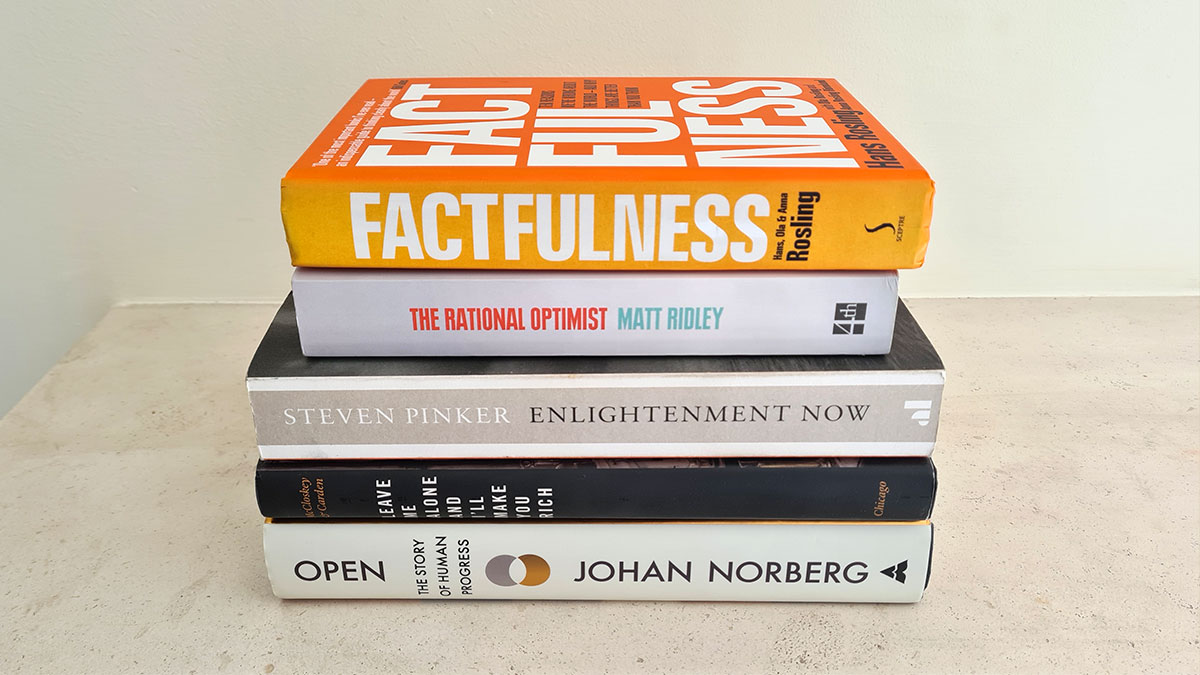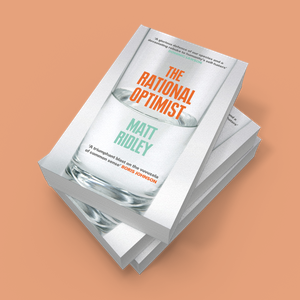We are doing amazing as a species. We have never been richer, safer, healthier, freer, or longer-lived.
I enjoy reading because it allows me to enter the mind of the author and walk with them for a longer period of time, mapping their thinking process. This is something that generative AI or video snippets cannot replicate.
A great book inspires and leaves me with a greater sense of conviction about the subject matter. I won’t say The Rational Optimist: How Prosperity Evolves left me feeling this way all the way, but largely, I felt challenged and motivated.
Matt Ridley’s core argument in The Rational Optimist is that free trade and exchange of ideas – what he calls “ideas having sex” – is the fundamental tenet of human prosperity. He likens humanity’s prosperity to the gene evolution process – that is to say, just like genes, ideas evolve through exchange and recombination, and the stronger ones survive.
Factfulness made me realize that mainstream media have a bias for reporting negativity, because that’s what sells for them, and for some reason, as a species, we tend to gravitate towards negative thoughts and feelings (negativity bias).
Therefore, from the synopsis, I knew that Rational Optimist would challenge my negative bias about the state of the world. Things are actually getting better, not worse, as the majority of people, especially world leaders and scientists, often claim.

From the book, I learnt a great deal about the impact of coal on the world’s industrialization, starting in Britain in the mid-18th century and accelerating through the 19th century. It’s easy to vilify coal as a non-renewable source of energy that is wreaking havoc on our planet. But it’s quite ironic that without it, our civilization would not have enjoyed the development and prosperity it has hitherto achieved.
Coal is the backbone of our industrialization efforts, and it’s very unfair to highlight only its demerits. The majority of my age group (Gen Zs) has only been taught the correlation between coal and climate change, rarely learning about its role in building our society as we see and live in it today.
I commend Ridley for painting a pragmatic picture of coal.
However, and this is very important, Ridley provides an overly nuanced view of coal, which, at face value, I took as downplaying climate change as a real existential threat of our time. I’m not alone on this: Bill Gates, on his elaborate review of the same book back in 2010, wrote that “Mr. Ridley dismisses concern about climate change as another instance of unfounded pessimism… but he fails to prove that we shouldn’t invest in reducing greenhouse gases.”
While the book is meant to convey optimism – a rational one, for that matter – it’s also important to lay bare the truth about our pressing challenges. Otherwise, the optimism becomes irrational.
Talking of the need to lay things bare, Ridley does a wonderful job establishing that our epoch is experiencing freedom and better living standards as no other generation ever on this planet, and that societal inequalities are less compared to any other generation ever to walk this planet.
We are doing amazing as a species. We have never been richer, safer, healthier, freer, or longer-lived. People are dying of obesity (too much eating), not hunger. It takes record times to develop vaccines for killer viruses, such as COVID-19. Let me elaborate on the latter below:
Scholars estimate that the Black Death killed up to approximately 50 million people in Europe in the 14th century, which was about 50% of Europe’s population at the time, whereas confirmed COVID-19 deaths since 2019 stand at about 7 million people.
(It’s worth noting that the above-stated COVID-19 deaths do not account for excess-death estimates, which could take the cumulative deaths to approximately 14 million. However, this number is still significantly lower compared to deaths from the Bubonic plague.)
Therefore, although the COVID-19 pandemic was devastating, its scale of mortality is much lower than pre-modern pandemics in history. This is attributed to the time it took to identify and understand the COVID-19 virus, and the subsequent time it took to develop its vaccine.
This reminds me of Bill Gates’ recent article titled “I’m Still Optimistic About Global Health,” where he highlights that in just a quarter of a century since the year 2000, the global child mortality has been cut by 50%, and with continued favourable policy interventions, scientific funding, and commitments from governments, the figure could be further cut into half in the next 20 years. That’s rational optimism!
The Rational Optimist does a great job in galvanizing humanity’s prosperity around scientific discoveries. It challenged my view on genetically modified crops. Since I can remember, I have always refuted GMOs out of unproven fears. I like Bill Gates a lot, but one of the few areas of his ideology that has always repelled me is his stance on GMOs. This is a topic that I’m currently actively exploring, and the results are quite mixed so far.
It turns out that this scientific discovery has prevented humanity from hunger and poverty for a long time now. I was tempted to counterargue that the Westerner’s bodily immunity isn’t as strong as Africa’s due to our not consuming a lot of genetically modified food, but this comes out rather as mere popular propaganda in the Global South.
Another important lesson for me from the book is how self-sufficiency is counterproductive to human progress, despite being a morally and culturally virtuous trait. A community that produces all it needs for survival lacks the motivation to innovate. On the other hand, a community that barters with its neighbours innovates and grows faster.
Ridley juxtaposed countries such as North Korea and China under Mao’s leadership, which promoted autarky and ended up in poverty and economic stagnation, with countries like the United States and Britain, which opened their doors for trade and ended up prosperous.
Innovation follows exchange and specialization, whereas self-sufficiency results in economic stagnation. This is because self-sufficiency isolates people, thereby limiting creativity, diversity of ideas, and efficiency.
Ridley uses the last words of the book to invite us to be optimistic about the 21st century by writing, “The twenty-first century will be a magnificent time to be alive. Dare to be an optimist.”
